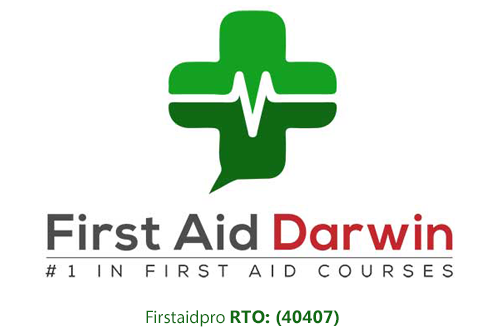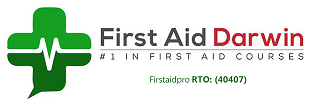Course Name
HLTAID012 - Provide First Aid in an education and care setting
Course Code Included
HLTAID011 – Provide First Aid (included)
Course Cost
$119 (may vary)
Course Duration
6.5 Hours
Is the course accredited?
Yes
Does the course meet workplace requirements?
Yes
Previously Known as
Provide CPR
Provide cardiopulmonary resuscitation
Perform CPR
CPR refresher
CPR update course
Available Discounts
Group Booking Discounts Available
HLTAID012 Provide First Aid in an education and care setting (Face-to-Face)
HLTAID012 Provide First Aid in an education and care setting is the latest release of the now superseded HTLAID004 Provide an emergency first aid response in an education and care setting.
Education and Childcare employees or individuals who are around infants and children on a regular basis should complete this course.
First Aid Darwin offers this course in a manner that covers ALL the knowledge and practical requirements of HLTAID011; provide First Aid PLUS common infant and child illnesses including vomiting, fever, febrile convulsion, dehydration and diarrhoea.
HLTAID012 Provide First Aid in an education and care setting is deemed compliant by the Australian Children’s Education and Care Quality Authority (ACECQA) because of its focus on these and other conditions.
This course may also contribute towards approved first aid, asthma and anaphylaxis training under the Education and Care Services National Law and the Education and Care Services National Regulations.
Face-to-Face (6.5 hours in class)
Knowledge + Practical Assessment in class – no online or out-of-class assessment.
First Aid Darwin is Darwin’s leading provider of HLTAID012 Provide First Aid in an education and care setting as a face-to-face course with no online or out-of-class assessment.
All knowledge and practical work is done in class in a single 6.5-hour session run by a fully qualified and accredited childcare first aid trainer.
Avoid the hassle of submitting assessments online or logging into virtual chat rooms and enjoy the personal touch of a traditional face-to-face first aid course.
Course times
Our First Aid Practical Skills and Assessment Workshops run in Darwin every day of the week. Course times do vary, so check the course calendar HERE
8 am – 2:30 pm (6.5 hrs in class)
Course cost
- $119 (May vary due to daily deals)
- Price match guarantee on comparable courses (T&C)
Childcare First Aid certificate issued same day
No Hidden Costs | Fully Accredited | Same Day Certificates (T&C)
You will be issued your certificate of completion electronically once you have successfully completed the training course.
Statement of Attainment
Your statement of attainment will include the following accredited units of competency:
HLTAID012 Provide first aid in an education and care setting
HLTAID011 Provide First Aid
HLTAID010 Provide basic emergency life support
HLTAID009 Provide cardiopulmonary resuscitation
In line with Australian Resuscitation Council guidelines, HLTAID011 should be updated every 3 years and HLTAID009 every 12 months.
First Aid course materials
Imbedded in the course cost is access to all the first aid materials, equipment and resources needed to complete this course.
Students who enrol with First Aid Darwin get exclusive access to:
- First Aid Learner Guide
- First Aid training videos
- First Aid multimedia presentation
- First Aid equipment including:
- CPR manikins
- Adrenaline auto-injector training devices
- AED training devices
- Placebo bronchodilator and spacer device
- A fully stocked first aid kit
Personal protective equipment (PPE)
Knowledge requirements (assessed in class)
Demonstrated knowledge required to complete the tasks outlined in elements and performance criteria of this unit:
Guidelines and procedures including:
- ARC Guidelines relevant to the provision of first aid to infants, children and adults
- first aid guidelines from Australian national peak clinical bodies
- potential incident hazards and risk minimisation processes when providing first aid
- infection control procedures, including use of standard precautions and resuscitation barrier devices
- requirements for currency of skill and knowledge
- first aid codes of practice
- appropriate workplace or site procedures relevant to the provision of first aid
- contents of first aid kits
Legal, workplace and community considerations, including:
- first aid requirements for services under the Education and Care Services National Law
- State or Territory regulations covering first aid in an Education and Care setting
- duty of care requirements
- own skills and limitations
- consent, including situations in which parental or caregiver consent is required
- privacy and confidentiality requirements
- awareness of potential need for stress management techniques and available support for rescuers and children
Considerations when providing CPR, including:
- upper airway and effect of positional change
- appropriate duration and cessation of CPR
- appropriate use of an AED, including specific considerations when using an AED on children
- safety and maintenance procedures for an AED
- chain of survival
- how to access emergency services
- techniques for providing CPR to adults, children and infants including:
- how to recognise that a casualty is unconscious and not breathing normally
- rate, ratio and depth of compressions and ventilations
- correct hand positioning for compressions
- basic anatomy, physiology and the differences between adults, children and infants relating to CPR
Signs, symptoms and management of the following in children:
- allergic reaction
- anaphylaxis
- asthma
- non-life-threatening and life-threatening bleeding
- breathing difficulties
- burns
- choking
- diabetes
- dehydration
- drowning
- envenomation – all current treatments
- eye injuries
- febrile convulsions
- fever
- fractures, dislocations, sprains and strains
- head, neck and spinal injuries
- hypothermia
- hyperthermia
- minor wounds
- pain
- shock
- nose-bleed
- poisoning
- seizures
- vomiting and diarrhoea
Identification and management of a sick infant or child including:
- general signs and symptoms of acute illness in children and infants
- referral and advice services including recognition of signs or symptoms requiring immediate ambulance response
- emergency action plans for known medical conditions including Asthma and Anaphylaxis
- age-appropriate communication and distraction techniques
- first aider response to basic physiological differences in children.
Practical skills (assessed in class)
There must be evidence that the candidate has completed the following tasks in line with State/Territory regulations, first aid codes of practice, first aid guidelines determined by the Australian Resuscitation Council (ARC) and other Australian national peak clinical bodies and workplace or site procedures:
- managed, in line with ARC guidelines, the unconscious, breathing casualty including appropriate positioning to reduce the risk of airway compromise
Managed, in line with ARC guidelines, the unconscious, non-breathing adult, including:
- performing at least 2 minutes of uninterrupted single rescuer cardiopulmonary resuscitation (CPR) (5 cycles of both compressions and ventilations) on an adult resuscitation manikin placed on the floor
- following the prompts of an automated external defibrillator (AED) to deliver at least one shock
- demonstrating a rotation of single-rescuer operators with minimal interruptions to compressions
- responding appropriately in the event of regurgitation or vomiting
Managed, in line with ARC guidelines, the unconscious, non-breathing child, including:
- performing at least 2 minutes of uninterrupted single rescuer cardiopulmonary resuscitation (CPR) (5 cycles of both compressions and ventilations) on a child resuscitation manikin placed on the floor
Managed, in line with ARC guidelines, the unconscious, non-breathing infant, including:
- performing at least 2 minutes of uninterrupted single rescuer CPR (5 cycles both compressions and ventilations) on an infant resuscitation manikin placed on a firm surface
Managed casualties, with the following:
- anaphylaxis
- asthma
- non-life-threatening bleeding
- choking
- envenomation, using pressure immobilisation
- fractures, dislocations, sprains and strains, using appropriate immobilisation techniques
- minor wound cleaning and dressing
- nosebleed
- shock
Responded to at least one simulated first aid incident contextualised to the candidate’s workplace or site, where the candidate has no knowledge of the casualty’s condition prior to starting treatment, including:
- identifying the casualty’s illness or injury through history, signs and symptoms
- using Personal Protective Equipment (PPE) as required
- providing appropriate first aid treatment
- conveying incident details to emergency services or advising casualty on any required post-incident action
- providing an accurate verbal and written report of the incident
- reviewing the incident.
First aid locations across Darwin
Darwin: DoubleTree Hilton, Level 5, 116 The Esplanade, Darwin NT 0800
Katherine: Ibis Styles Katherine, 9 Cyprus St, Katherine NT 0850
USI requirements
A USI (unique student identifier) number is a mandatory requirement for any student wishing to undertake vocational training. A USI number is unique to you and provided by the government to keep a secure online record of your VET certifications. You can look up your number or register for a USI number quickly and easily by clicking on the following link: https://www.usi.gov.au/students/create-usi.
Covid-19 Precautions
At First Aid Courses Darwin your health and safety is our priority. Infection control measures and Covid-19 practices are applied across all our training facilities including but not limited to:
- Personal protective equipment (PPE)
- Social distancing, where possible
- Cleaning and sterilisation of equipment and materials
- Learner sign-in sheets
Eight New First Aid Units of Competency Released
- HLTAID009 Provide cardiopulmonary resuscitation – sometimes referred to as CPR (supersedes HLTAID001 Provide cardiopulmonary resuscitation)
- HLTAID010 Provide basic emergency life support – sometimes referred to as BELS (supersedes HLTAID002 Provide basic emergency life support)
- HLTAID011 Provide First Aid – sometimes referred to as First Aid (supersedes HLTAID003 Provide first aid)
- HLTAID012 Provide First Aid in an education and care setting – sometimes called Childcare first aid (supersedes HLTAID004 Provide an emergency first aid response in an education and care setting)
- HLTAID013 Provide First Aid in a remote or isolated site(supersedes HLTAID005 Remote first aid)
- HLTAID014 Provide Advanced First Aid(supersedes HLTAID006)
- HLTAID015 Provide advanced resuscitation and oxygen therapy(supersedes HLTAID007)
- HLTAID016* Manage first aid services and resources(supersedes HLTAID008)
Your Certificate
-
Get your fully accredited first aid certificate on the same day.
After successfully completing your training with First Aid Darwin you will receive a fully Accredited Recognised Statement of Attainment for your first aid course.



